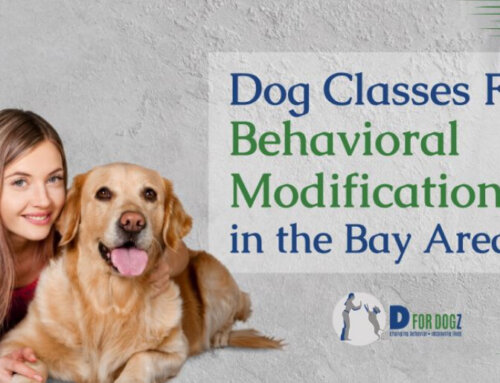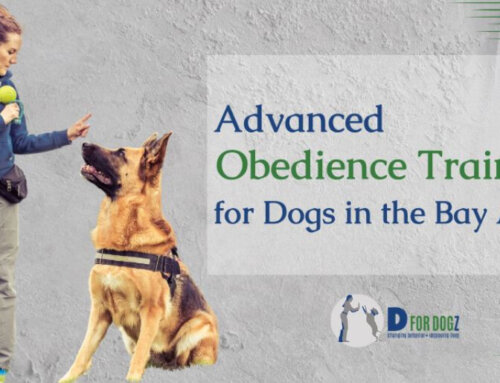Essential Guide to Healthy and Happy Puppy Playdates
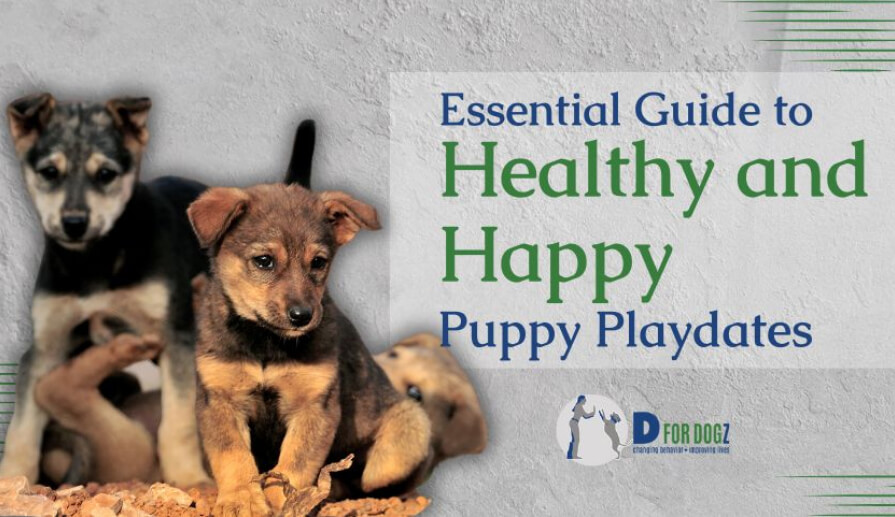
Puppy playdates are integral to a puppy’s early development, serving as a cornerstone for instilling crucial social skills, preventing future behavioral issues, and nurturing well-rounded canine companions. Through these interactive sessions, puppies learn vital communication cues and adapt to new experiences, fostering confidence and sociability. This streamlined approach to socialization enhances their quality of life and prepares them for a harmonious existence within the broader dog and human community.
Having established the fundamental role of puppy playdates in the early stages of a dog’s life, let’s delve into the specific benefits these interactions provide. From fostering social skills to mitigating behavioral challenges, the importance of playdates extends beyond simple play.
Key Takeaways
- Introducing puppies to playdates can help prevent separation anxiety and build their confidence in social settings.
- Monitoring play intensity and duration is crucial to prevent overstimulation and ensure puppies are not exhausted.
- Older or timid dogs can also benefit from carefully managed playdates, improving their social confidence.
- Protecting puppies from communicable diseases involves vaccinating all dogs and choosing safe, clean environments for playdates.
Importance of Puppy Playdates
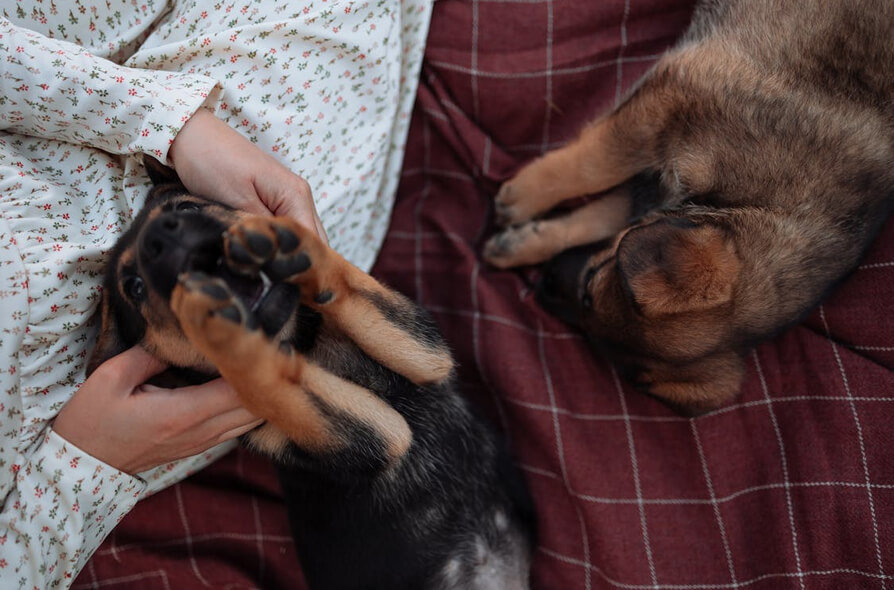
Image Source: Freepik
Foundation for Social Skills
Puppy playdates are an essential platform for young dogs to master the art of canine communication and appropriate social behavior. During these play sessions, puppies interact with various dogs and humans, learning to interpret and respond to various signals and body language. This interaction is critical; it teaches them how to engage with their peers and people properly.
For instance, through play, puppies understand the nuances of play bows, growls, and barks as part of their communication repertoire, distinguishing between playful gestures and aggressive warnings.
The subtleties of this learning process are profound. Puppies that frequently engage in playdates are observed to develop better impulse control, patience, and empathy. This leads to well-mannered adult dogs adept at navigating the social intricacies of the dog world and human interactions. These foundational skills are indispensable, laying the groundwork for a socially competent dog capable of forming healthy relationships throughout life.
Preventing Behavioral Problems
The role of puppy playdates in mitigating future behavioral problems cannot be overstated. By exposing puppies to diverse situations and environments in a controlled, positive manner, these interactions significantly reduce the likelihood of developing anxieties, phobias, or aggressive tendencies later in life.
The variety of experiences encountered during playdates, from meeting new dogs to exploring unfamiliar settings, ensures that puppies grow accustomed to change and novelty, seeing them as standard parts of life rather than threats.
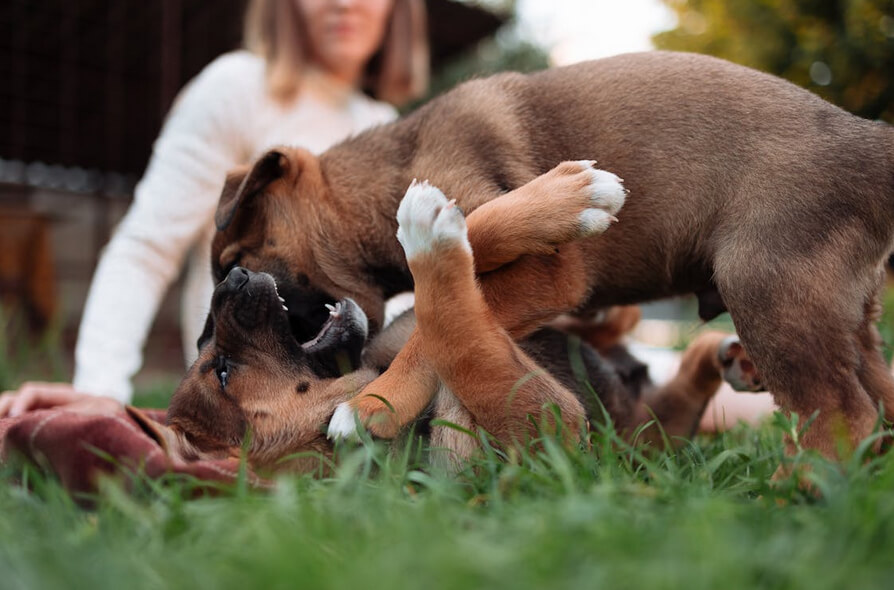
Image Source: Freepik
This early exposure is crucial in preventing the development of fear-based behaviors, which are often at the root of aggression and anxiety in dogs. Regular, positive interactions with various stimuli equip puppies with the coping mechanisms to handle stress and unfamiliarity confidently rather than fear, leading to a more adaptable and well-adjusted dog.
Stress Signs:
- Whining or Barking: Excessive vocalization can be a sign of discomfort.
- Pacing or Shivering: Indicates nervousness or anxiety.
- Licking Lips or Yawning: Often a stress signal when not tired or eating.
- Avoidance Behavior: Trying to hide or escape the situation.
- Stiff Body Posture: A tense body can signal stress or the beginning of aggression.
- Flattened Ears: Ears pinned back against the head.
Aggression Signs:
- Growling or Snarling: A clear warning to back off.
- Baring Teeth: Preparing to bite in defense or to assert dominance.
- Fixed Stare: Direct eye contact as a challenge.
- Lunging or Snapping: Without contact, it’s a warning; with contact, it’s an escalation.
Actions to Take When Signs Are Observed
Immediately taking action is crucial to preventing adverse outcomes when you notice any of the above signs of stress or aggression.
- Calmly Separate the Dogs: Do not panic or shout, as this can exacerbate the situation. Gently guide your puppy away using their leash or direct them to a quiet area to calm down. If necessary, use a barrier like a gate to separate the dogs.
- Reduce Stimulation: Move to a less stimulating environment or decrease the stimuli (e.g., fewer dogs, quieter space).
- Offer a Distraction: Providing a toy or treat can redirect your puppy’s attention from the stressor.
- Practice Positive Reinforcement: Reward calm behavior with treats and praise to reinforce that remaining calm is desirable.
- Give Them Time: Allow your puppy some time to calm down before reintroducing them to the playdate or deciding to end the session early.
- Consult a Professional: If stress or aggression is a recurring problem, seek advice from a professional dog trainer or behaviorist. They can provide targeted strategies for your puppy’s specific issues.
- Gradual Reintroduction: If you reintroduce the puppies, do so gradually and in a controlled environment. Monitor closely for any signs of stress or aggression.
Enhancing Confidence and Reducing Fear
Familiarizing puppies with new experiences during their critical socialization window (typically the first three to four months of their lives) is paramount in building their confidence and reducing fear.
Playdates are a perfect opportunity to introduce puppies gently and safely to various environments, sounds, creatures, and people, helping them develop a sense of security and trust in the world around them. The positive experiences gained through these playdates reinforce the idea that the world is a friendly place, diminishing the likelihood of fear responses as they grow.
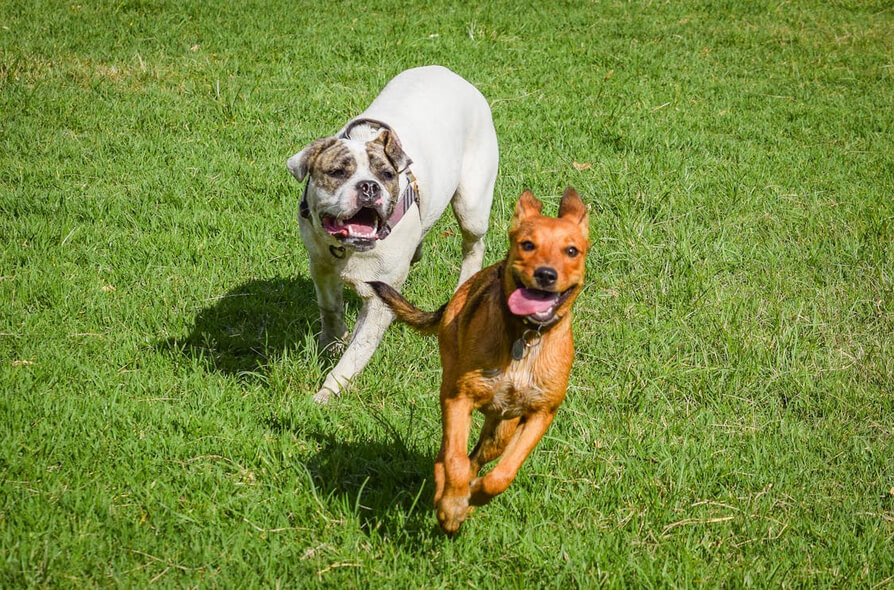
Image Source: Pexels
A confident puppy is more likely to approach new situations with curiosity rather than fear, showing resilience in facing challenges. This early confidence-building plays a vital role in shaping a dog’s personality and behavior, contributing to a well-balanced, happy adult dog.
Puppies that have been well-socialized through playdates often exhibit less fear and anxiety in different situations, from vet visits to encountering strangers, making them easier to handle and more enjoyable companions in various settings.
Physical and Mental Stimulation
Beyond social benefits, playdates offer essential physical and mental stimulation for puppies. Playing helps develop physical coordination, strength, and agility. It also stimulates their minds, encouraging problem-solving skills and cognitive development.
Activities such as chasing, fetching, and interactive play with toys or other dogs keep their bodies and minds engaged, promoting overall well-being. This balance of physical exertion and mental engagement is crucial for a puppy’s development, ensuring they grow into physically healthy and mentally sharp adult dogs.
Safety and Vaccination Considerations
While puppy playdates have many benefits, it’s crucial to approach them with safety and health in mind. Ensuring all participating puppies are properly vaccinated is paramount to preventing the spread of infectious diseases. It’s important to start socializing after puppies receive their initial vaccinations, but consult a veterinarian for the best timing.
Additionally, the play environment should be safe and conducive to positive interactions. This includes choosing clean, secure playdate locations and closely supervising interactions to prevent injuries. Prioritizing safety and vaccination not only protects the health of the puppies involved but also supports a positive playdate experience for everyone.
How to Organize Successful Puppy Playdates

Image Source: Freepik
Organizing successful puppy playdates is an art that, when done right, can significantly contribute to your puppy’s social and emotional development. Here’s a detailed guide on how to make the most of these opportunities:
Selecting Playmates
Choosing the right playmates for your puppy is crucial for a safe and beneficial playdate. It’s essential to consider several factors to ensure compatibility and prevent any potential issues:
- Size and Strength: Matching playmates by size and strength can help avoid accidental injuries. Larger or more boisterous dogs could unintentionally harm smaller or more timid puppies during play.
- Temperament: Look for playmates with compatible temperaments. Dogs that are too dominant or submissive compared to your puppy might not interact well, leading to fear or aggression.
- Vaccination Status: Ensure all participating puppies are up to date on vaccinations to prevent the spread of diseases. This is a critical health consideration that protects all involved parties.
Creating a Positive Environment
The setting and management of the playdate can significantly impact its success:
- Neutral Territory: Hosting the playdate in a neutral location can prevent territorial behaviors and make all puppies feel more comfortable. Public parks or dog-friendly areas that are not “owned” by any of the participants are ideal.
- Supervision: Constant supervision is necessary to intervene if play becomes too rough or if a puppy shows signs of stress. Adults present should be familiar with basic dog behavior to manage the group effectively.
- Positive Reinforcement: Use treats and praises to encourage desired behaviors. This makes the playdate more enjoyable and reinforces good manners and social skills.
Understanding Dog Body Language
Being able to read and respond to canine body language is vital for safely managing interactions during playdates:
- Signs of Playfulness: A play bow, wagging tail at a moderate level, and relaxed body posture are indicators of a dog ready and willing to play.
- Stress or Aggression Cues: Growling, stiff body posture, flattened ears, and avoiding eye contact can signal discomfort or aggression. Recognizing these signs early allows for timely intervention to prevent escalation.
- Calming Signals: Dogs often use calming signals, like licking their nose, yawning, or turning their head away, to communicate discomfort or attempt to de-escalate tense situations. Observing these signals helps in managing the playdate dynamics effectively.
By carefully selecting playmates, creating a conducive environment, and understanding canine body language, you can ensure that puppy playdates are a positive experience for everyone involved. These interactions are invaluable for your puppy’s development, teaching them how to socialize properly, handle new situations, and enjoy the company of other dogs in a safe and controlled setting.
Age-Specific Considerations for Dog Playdates
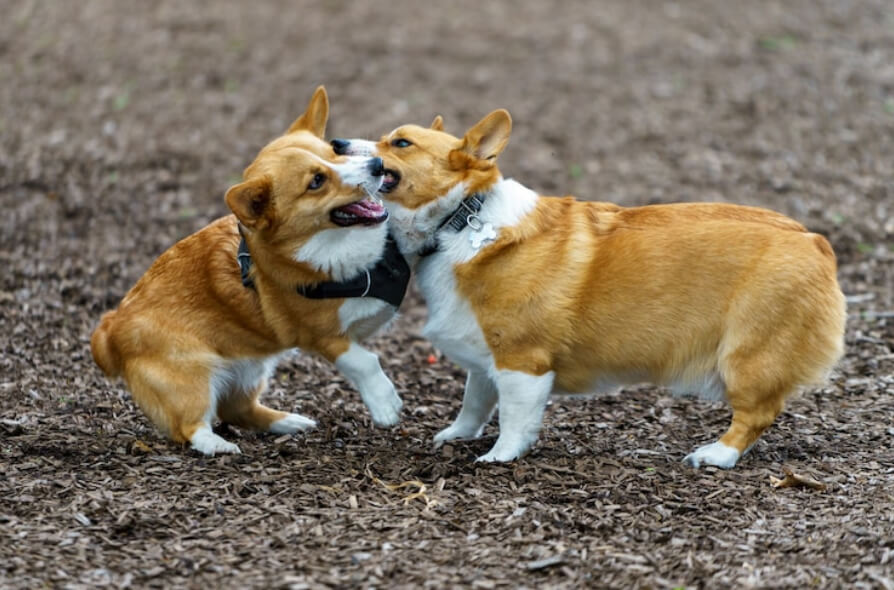
Image Source: Freepik
Puppies: The Formative Weeks
Playdates are essential for puppies, especially those in the critical socialization period of 8 to 16 weeks, for developing social cues and behaviors. During this time, focus on gentle introductions with various dogs in safe, controlled environments. Short, frequent sessions help prevent overstimulation and ensure positive experiences.
Tips for Puppy Playdates:
- Keep sessions short (15-20 minutes) to avoid overwhelming them.
- Introduce them to various dog breeds and sizes to enhance social skills.
- Monitor closely for signs of stress or fatigue, and end the playdate if observed.
Adolescent Dogs: Navigating the Teen Phase
Adolescent dogs, typically aged between 6 to 18 months, may exhibit fluctuating tolerance levels and a resurgence of fear phases. Their play can become rougher and tumbler. At this stage, reinforcing good play etiquette is key, and playdates should encourage positive interactions.
Tips for Adolescent Dog Playdates:
- Incorporate training sessions into playdates to reinforce commands and behaviors.
- Choose playmates with similar play styles and energy levels.
- Gradually introduce new experiences to continue their social education.
Adult Dogs: Mature Social Interactions
Playdates can be more challenging for adult dogs, especially those who might not have been well-socialized. Start with one-on-one interactions in a neutral setting, focusing on calm and positive introductions. Adult dogs can still learn social cues, but patience and gradual exposure are essential.
Tips for Adult Dog Playdates:
- Begin with short, controlled introductions to gauge comfort levels.
- Consider parallel walks before direct interaction to help dogs get accustomed to each other.
- Always supervise and be ready to intervene if play escalates to aggression.
Breed-Specific Playdates: Catering to Different Play Styles
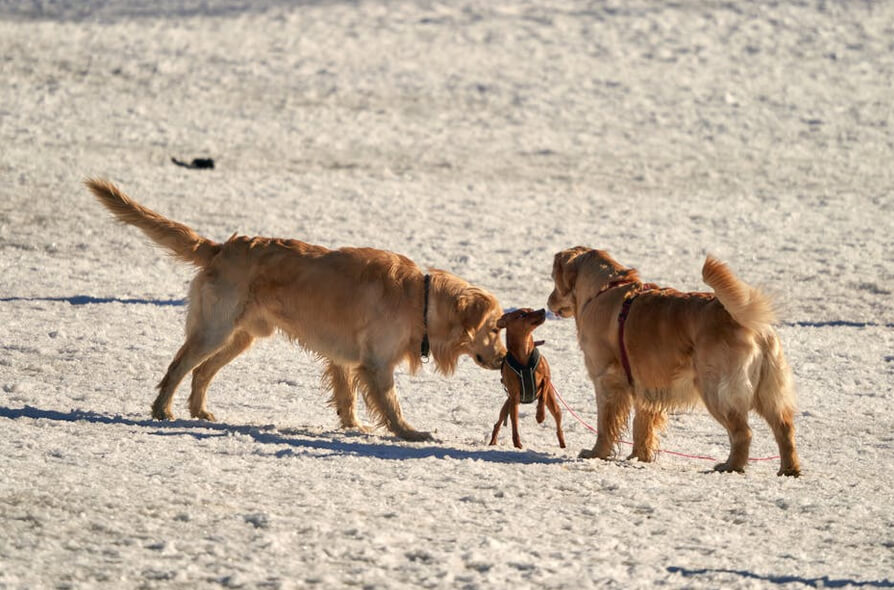
Image Source: Pexels
Understanding the inherent traits of dog breeds can significantly enhance the playdate experience. Some breeds have higher energy levels, while others may be more reserved. Breed-specific playdates can provide a compatible and enriching environment tailored to their natural tendencies.
High-Energy Breeds
Dogs like Border Collies, Australian Shepherds, and Labradors often enjoy high-intensity play and may engage in chasing, fetching, and wrestling.
Organizing Playdates for High-Energy Breeds:
- Choose a spacious, secure area where they can run freely.
- Include interactive toys that stimulate their need for physical activity and mental engagement.
- Pair them with dogs of similar energy levels and play styles to prevent overwhelming less active breeds.
Gentle Giants
Larger breeds, such as Great Danes and Mastiffs, may have a calm demeanor but still enjoy the company of other dogs. Their size can be intimidating to smaller breeds, even in play.
Tips for Large Breed Playdates:
- Ensure smaller dogs are comfortable with larger breeds to prevent fear or injury.
- Focus on activities that promote gentle interaction rather than rough play.
- Monitor play closely to ensure they respect each other’s size and strength.
Toy and Small Breeds
Small breeds like Chihuahuas and Pomeranians might be overwhelmed by larger dogs, even with the best intentions.
Organizing Playdates for Small Breeds:
- Create a safe, enclosed space to prevent them from getting accidentally hurt.
- Introduce toys and games that are size-appropriate.
- Keep a close eye on interactions to ensure play remains gentle and consensual.
Conclusion
Puppy playdates are more than just playful interactions; they are essential building blocks for a puppy’s developmental journey toward becoming a friendly, confident, and well-behaved dog. By carefully organizing these interactions, we enrich our puppies’ lives through social skills, confidence, and mental stimulation and safeguard their well-being with vigilant considerations for safety and health.
The thoughtful selection of playmates, creating a positive environment, and understanding dog body language are pivotal in ensuring these experiences are beneficial and enjoyable. Embracing the structured approach to puppy playdates can significantly impact our furry friends’ lives, fostering a harmonious relationship between them, their peers, and the world.
Ready to take the next step in your puppy’s social development? DForDog offers engaging Puppy Socials in the Bay Area, explicitly designed for puppies aged 8 to 20 weeks. These sessions provide a fantastic opportunity for your furry friend to learn, play, and grow in a safe and structured environment. Join us and see the difference firsthand.
FAQS
About the Author: Kaajal Tiwary
Kaajal (aka “KT”!) loves puppies and is dedicated to getting new puppy guardians off on the right paw and guiding her students through the tough early days of owning a dog. Her goal? Transforming each bundle of raw puppy energy into the perfect adult companion.


